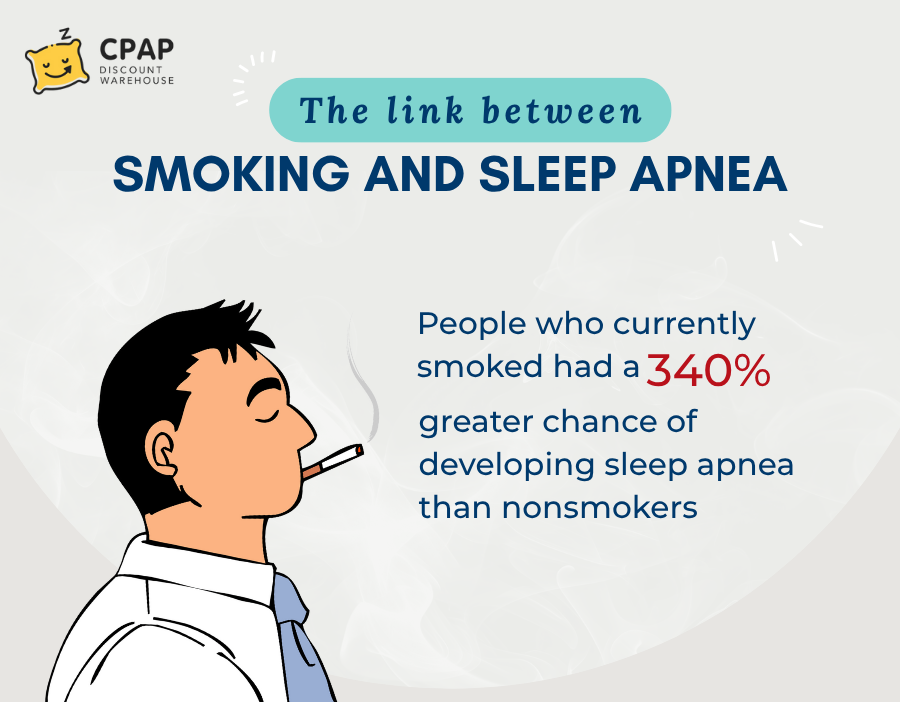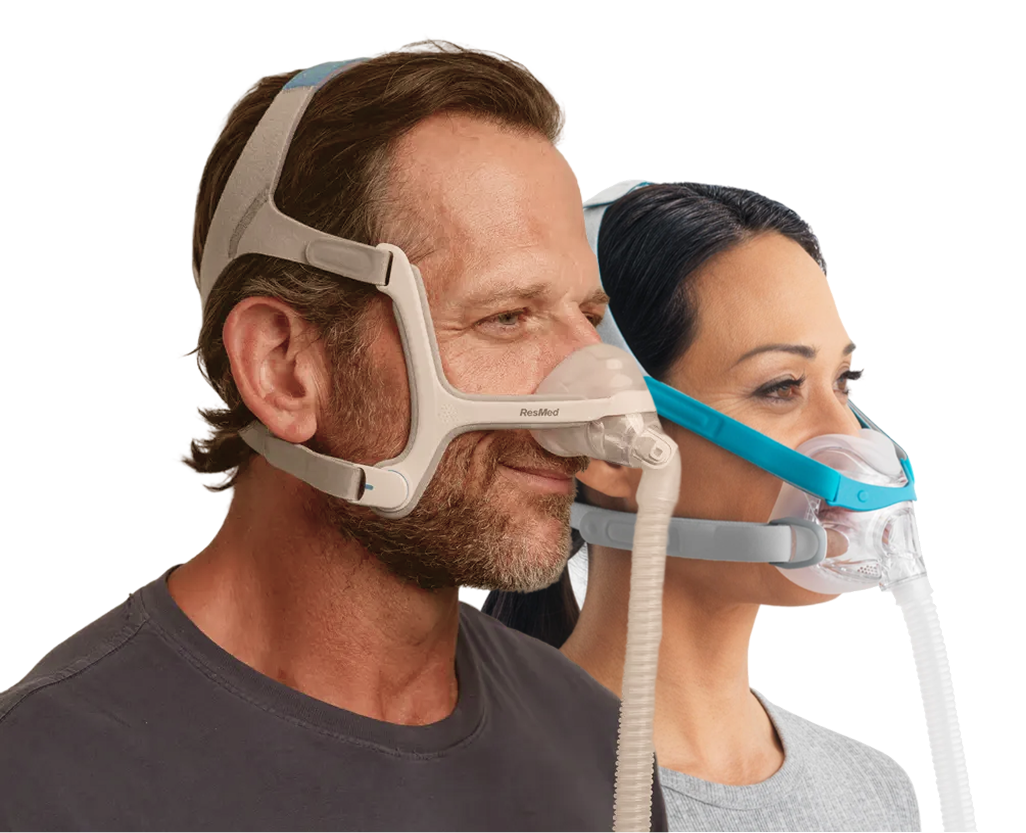Smoking is one of the factors contributing to the increased burden of sleep-related diseases, especially sleep apnea. More and more medical evidence shows a close connection between smoking and sleep apnea. This causes experts to warn about the risk and worsening progression in regular smokers. So, exactly how does smoking increase the risk of sleep apnea? And does quitting smoking and sleeping apnea improve symptoms? Let us find out the details through the article below.
The basics of sleep apnea
There are three main types of sleep apnea: obstructive, central, and complex (or mixed). OSA is by far the most common type. It occurs when the tissues at the back of the throat relax and fall into the airway, temporarily blocking normal airflow. Central sleep apnea involves a problem with the neuromuscular responses responsible for breathing during sleep. Complex sleep apnea is a combination of the other two types.
If you have sleep apnea, you may experience dozens of sleep interruptions per night without realizing it. These interruptions repeatedly interfere with oxygen flow, increasing the risk of health problems.
+ Heart disease.
+ Heart attack.
+ Stroke.
+ High blood pressure.
They can also increase your risk of obesity and diabetes. While snoring is a common symptom of sleep apnea, the two conditions are not always related. You could have sleep apnea even if you don’t snore.
Sleep apnea tends to occur more often in males, overweight individuals, and people with large necks and narrow airways. As with many chronic medical conditions, the risk of sleep apnea increases with age. It is also more prevalent among smokers.

>>>> How is sleep apnea diagnosed? Sleep Apnea Testing
How does smoking affect sleep apnea?
Science has proven that smoking and sleep apnea have a clear correlation. Smoking causes inflammation and edema of the upper respiratory tract, leading to narrowing of the airways and easily causing obstruction during sleep. Cigarette smoke contains toxic ingredients that irritate the mucous membranes, increase mucus secretion and damage respiratory structures, especially the oropharynx, a location prone to obstruction during sleep.
Besides, smoking also reduces the amount of oxygen inhaled, negatively affecting gas exchange during sleep, making OSA worse. Smokers often have a higher apnea-hypopnea index (AHI) than non-smokers, and lower oxygen saturation levels.
A histological analysis study has shown that the thickening and edema of the uvula mucosa, a consequence of the neuroinflammatory response caused by nicotine, contributes significantly to airway narrowing in OSA patients who smoke. This explains why the rate of snoring, apnea and hypoxemia during the night in this group is high, clearly shown in sleep apnea smoking.

How does smoking cause sleep apnea?
Smoking has a profound effect on the structure and function of the respiratory system, notably increasing the risk of damage and edema of the upper respiratory tract mucosa, where obstruction in sleep apnea syndrome can easily occur.
Medical studies have proven that smoke from cigarettes contains more than 7,000 toxic chemicals. These include oxidizing agents, which will promote a chronic inflammatory reaction in the oropharynx, leading to thickening and edema of the mucosa and increased mucus secretion. This condition causes the airway "gateway" to be significantly narrowed, increasing the likelihood of airway collapse during sleep, a central factor in the formation of sleep apnea smoking.
It is also impossible to ignore the effects of nicotine on the central and peripheral nervous systems. Nicotine stimulates and reduces the response of the nerves that control the muscles of the pharynx, which play the role of "keeping open" the airway during sleep. When this function is weakened, the risk of airway collapse increases, creating conditions for apnea episodes to appear more densely and last longer.
In particular, smoking and sleep apnea are also related through their impact on sleep structure. The chemicals in cigarettes can disrupt normal circadian rhythms, increase the number of micro-arousals, and reduce the amount of deep sleep that helps the body recover. As a result, not only does it increase the risk of OSA onset, but it also makes it difficult for patients to control symptoms, worsens the level of daytime sleepiness, and prolongs overall sleep disorders.

>>>> What Are The Causes Of Sleep Apnea?
Does OSA predispose to smoking?
In addition to the effect of smoking increasing the risk of OSA, clinical studies also found the opposite effect. People with OSA themselves are also at high risk of developing or relapsing into smoking. This mechanism comes from the fact that OSA causes chronic sleep deprivation, sleep quality disorders, frequent awakenings in the middle of the night, and results in fatigue and irritability during the day.
Many OSA patients have anxiety disorders, mild depression, or persistent feelings of stress. In such a state, they easily turn to cigarettes to quickly relieve fatigue or stress thanks to their short-term stimulating effect on the central nervous system. Even clinical surveys show that the relapse rate in the OSA group is higher than in the general population. Especially when they have sleep problems that are not well controlled or go through a period of stopping smoking with severe withdrawal symptoms.
This pathological spiral makes treating both conditions difficult. OSA increases the need for nicotine, and smoking aggravates OSA. Therefore, thoroughly controlling sleep quality and timely medical intervention play a key role in improving the success rate of smoking cessation in this group of patients.
Can quitting smoking cure sleep apnea?
Although quitting smoking brings many benefits to health in general and sleep in particular. Experts note that quitting smoking and sleep apnea does not mean that sleep apnea will completely go away. However, research shows that after quitting smoking, the risk and severity of OSA are significantly reduced compared to those who continue to smoke - especially in those who successfully quit long term.
Improvements include reduced edema and inflammation in the upper respiratory tract, reduced snoring and number of apnea episodes, improved oxygen saturation levels, increased duration of deep sleep, and reduced night awakenings. However, in the early stages of quitting smoking, there may be insomnia, increased wakefulness, and difficulty sleeping lasting up to several weeks, caused by nicotine withdrawal syndrome.
Smoking cessation helps sleep apnea treatments, such as CPAP, to be more effective, clear the airways, and reduce the risk of related cardiovascular complications. In particular, combining stress control, building scientific sleep habits, close monitoring, and professional support is the key to improving the quality of life for OSA patients.
FAQs
Can sleep apnea kill you?
Yes. Obstructive sleep apnea can be life-threatening if not well controlled. Repeated lack of oxygen at night increases the risk of heart attacks, strokes, and arrhythmias. Especially in people who smoking sleep apnea, the combined effects of cigarettes make the level of hypoxia worse. Causes higher risks of traffic accidents due to daytime drowsiness and sudden death.
Can sleep apnea be cured?
There are treatments that can help, like using a CPAP machine to help you breathe while you sleep. But sleep apnea is a long-term condition, and there's no magic bullet to make it go away completely. The best thing to do is to reduce the symptoms and make changes to your lifestyle to lessen its effect on you.
If I quit smoking will my sleep apnea go away?
If you're a non-smoker, quitting smoking can reduce your risk of developing sleep apnea. If you have sleep apnea, quitting smoking won't make the condition go away. However, quitting can make some of the symptoms and severity of sleep apnea better.
What are the warning signs of sleep apnea?
The most warning signs of obstructive and central sleep apneas include: Gasping for air during sleep, Morning headache, Awakening with a dry mouth, Excessive daytime sleepiness, known as hypersomnia, Difficulty staying asleep, known as insomnia, Difficulty paying attention while awake, Irritability.
>>>> Sleep Apnea Exercises: Tongue, Throat & Breathing to Stop Snoring
Conclusion
Smoking not only increases the incidence of sleep apnea but also makes the condition worse and more difficult to treat. Many studies have confirmed that smoking and sleep apnea are closely related through inflammation, structural damage, and neurological disorders in the upper respiratory tract. Smoking cessation helps gradually improve symptoms but requires regular monitoring and support from a specialist. Proactively screening and managing sleep well brings many practical benefits, improving quality of life.
References:
Krishnan, Vidya, et al. “Where There Is Smoke…there Is Sleep Apnea: Exploring the Relationship between Smoking and Sleep Apnea.” Chest, U.S. National Library of Medicine, Accessed 03 Aug. 2025.
SA;, Schroeder. “How Clinicians Can Help Smokers to Quit.” JAMA, U.S. National Library of Medicine. Accessed 03 Aug. 2025.
Service, US Public Health. “Smoking and Health.” CiNii Research. Accessed 03 Aug. 2025.






